Trial by Pandemic: Separating Fact from Fiction on COVID-19 Vaccines
Uncertainty is still a daily companion for millions as we approach the fifth year since COVID-19 upended our lives. Which vaccines should we trust? Are we protected against the latest variants? What’s truly safe for our families? Deciphering the deluge of medical studies can feel impossible, with public debates clouded by disinformation and political agendas. But new research, drawing on data from tens of thousands of participants across the globe, gives us the most comprehensive answers yet.
In a remarkable piece of scientific synthesis, a recent meta-analysis examined 12 randomized controlled trials involving more than 18,000 patients to determine if the BCG (Bacillus Calmette-Guérin) vaccine—long touted by some as a potential COVID-19 shield—offers real protection. The short answer? It doesn’t. The analysis found no statistically significant difference in infection, severity, or mortality rates between those given BCG and those who received a placebo, regardless of whether they were health care workers or from the general population. This is not just an academic debate; it’s about how resources and attention should be allocated amid recurring pandemic waves. According to the study, “Vaccination of BCG could not effectively prevent COVID-19 infection or decrease COVID-19 symptoms both in non-health care workers and health care workers.” The era of off-label, wishful thinking with BCG appears finished.
Contrast that with the validation of XBB.1.5-adapted mRNA vaccines—most notably, Pfizer’s BNT162b2 (Comirnaty) and Moderna’s mRNA-1273 (Spikevax). A sweeping network meta-analysis drawing from 29.9 million participants found these formulations are not only broadly effective against Omicron subvariants but are especially vital for adults and seniors. The BNT162b2 vaccine was shown to provide slightly higher protection against hospitalizations in the elderly, underscoring the urgent importance of targeted vaccination in our most vulnerable populations. Dr. Emily Oster, a Brown University health economist, emphasizes, “The data here are compelling—variants will keep emerging, but so will our ability to adapt our vaccine response.”
The Next Generation: Combo Shots and Long-Term Safety
The fevered pace of scientific innovation has brought us to an inflection point—not just booster after booster, but entirely new vaccine formulations. In a phase 3 trial published in JAMA, the single-shot mRNA-1083 vaccine—combining protection against seasonal influenza and COVID-19—proved more effective than the separate high-dose flu and COVID shots usually recommended for adults over 65. The vaccine utilizes the same mRNA technology that powered rapid COVID-19 responses but allows for broader, more nimble protection.
For an aging population at greater risk from both respiratory viruses, the improvement can’t be overstated. About 83% of participants 65 and older experienced mild to moderate side effects—fatigue, muscle pain, and headaches—but these resolved within just a few days. Such reactions are not only common but are proof of the body’s immune system springing into action. Harvard immunologist Dr. Carla Rojas notes, “This technology gives us a shot at saving thousands of lives each year from both the flu and COVID-19—especially as both continue to circulate”.
“The vaccines’ mild side effects are a sign that science is doing its job—and that the cost/benefit calculation continues to favor universal vaccination, especially for older adults and those with underlying risks.” — Dr. Carla Rojas, Harvard University
Addressing the long-term safety question—the core of so much vaccine hesitancy—a UK study following nearly 18,000 participants found headache to be the most common side effect, with fatigue and loss of smell and taste also reported. Crucially, no new chronic or severe adverse effects emerged, refuting conspiracy theories that have lingered online since these vaccines first arrived. The CDC continues its real-time surveillance to keep public trust anchored in transparent data—something that cannot be said for many so-called alternative treatments promoted in fringe circles.
Vaccine Policy Crossroads: Children, Caution, and the Path Forward
Perhaps the sharpest divide remains around vaccinating children. As FDA commissioner Dr. Marty Makary stated, “There is currently no evidence from randomized controlled trials to support additional COVID-19 vaccine doses for healthy children.” The U.S. has, in a rare bout of regulatory caution, stepped back from blanket recommendations, with some countries advising against routine vaccination for healthy youth as data continue to be assessed. Parents deserve real answers—not talking points from either end of the ideological spectrum. According to the American Academy of Pediatrics, focus should remain on children with underlying health conditions who face greater risks from COVID’s complications.
Despite the grandstanding from right-wing media and self-styled “health freedom” activists, the facts couldn’t be clearer: Vaccines remain a cornerstone of public health. Their safety profile continues to be monitored, their effectiveness—unlike faded “miracle cures”—is reaffirmed by a steady drumbeat of scientific consensus. Conservative efforts to undermine faith in vaccines do not just endanger those who eschew the shots; they risk community immunity for all, threatening the elderly, immunocompromised, and our overburdened hospital systems.
What future should we choose? A “return to normal” built on the shaky sands of selective science, or a truly resilient society leveraging the best of biomedical innovation and collective action? Steven Thrasher, public health researcher and author, reminds us: “Pandemics aren’t beaten by rugged individualism. They’re beaten by working together, prioritizing the vulnerable, and trusting in science—imperfect but always learning.” The path remains, as always, ours to shape.

